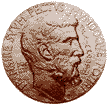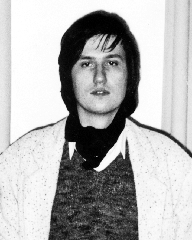Maxim Kontsevich 1998 Fields Medalist Maxim Kontsevich
1998 Fields Medalist Maxim Kontsevich

Maxim Kontsevich has established a reputation in pure mathematics andtheoretical physics, with influential ideas and deep insights. He hasbeen influenced by the work of Richard Feynmann and Edward Witten. Kontsevichis an expert in the so-called "string theory" and in quantum field theory. Hemade his name with contributions to four problems of geometry. He was able toprove a conjecture of Witten and demonstrate the mathematical equivalenceof two models of so-called quantum gravitation. The quantum theory ofgravity is an intermediate step towards a complete unified theory. Itharmonizes physical theories of the macrocosm (mass attraction) and themicrocosm (forces between elementary particles). Another result of Kontsevichrelates to knot theory. Knots mean exactly the same thing for mathematiciansas for everyone else, except that the two ends of the rope are alwaysjointed together. A key question in knot theory is, which of the variousknots are equivalent? Or in other words, which knots can be twisted andturned to produce another knot without the use of scissors? This question was raised at the beginning of the 20th century, but it is still unanswered.It is not even clear which knots can be undone, that is, converted to a simple loop. Mathematicians are looking for ways of classifying all knots.They would be assigned a number or function, with equivalent knots havingthe same number. Knots which are not equivalent must have different numbers.However, such a characterization of knots has not yet been achieved. Kontsevich has found the best "knot invariant" so far. Although knot theoryis part of pure mathematics, there seem to be scientific applications. Knotstructures occur in cosmology, statistical mechanics and genetics.
Maxim Kontsevich (born 25 August 1964) is professor at the Institutedes Hautes Etudes Scientific (I.H.E.S) in France and visiting professor atRutgers University in New Brunswick (USA). After studying at the Moscow University and beginning research at the "Institute for Problems ofInformation Processing," he gained a doctorate at the University of Bonn,Germany in 1992. He then received invitations to Harvard, Princeton, Berkeleyand Bonn.
Welcome to the
Feature Column!
These web essays are designed for those who have already discovered the joys of mathematics as well as for those who may be uncomfortable with mathematics.
Read more . . .
Feature Column at a glance




